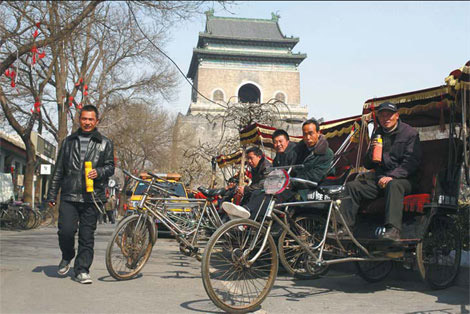The key appears to be tourism
Updated: 2012-03-29 09:41
By Cheng Anqi and Han Bingbin (China Daily)
|
|||||||||||
 |
|
Rickshaw drivers wait for customers. |
There are few tourists taking the rickshaws in the soon-to-be renovated area surrounding Beijing's Drum and Bell towers in the cold months, even though they stock blankets.
Drivers roam the square to hunt for customers or nap in their rickshaws.
Henan native Yang Xinyi says he believes the renovation will help his business.
"More tourists means I can earn more and my income is more stable," the 45-year-old says.
Drivers can find three rides' worth of customers a day, charging individuals or pairs about 80 yuan ($12.6) but only keeping 5 yuan for themselves, after paying the company.
This season brings only a few hundred yuan a month.
So Yang has taken a graveyard shift job as a doorkeeper. A warm afternoon without customers offers a precious nap.
But he can give more than 10 rides a day in the busy season, bringing in more than 2,000 yuan a month.
Tour guide Yang Nan, also from Henan, is less optimistic.
"Many foreign tourists tell me they are interested in hutong culture. It's basic and ancient but original," Yang says.
"But what will they think if the hutong became commercialized tourism zones? If it ruins the hutong in tourists' eyes, what happens to my income?"
The 25-year-old came to Beijing to work as a hutong tour guide two years ago and lives in a ramshackle 12-square-meter traditional house in Zhongku Hutong that will allegedly be demolished in the second phase.
Yang Nan and Wushang Tourism Company's other 14 guides try to serve as many tour groups as they can - about six a day, at an hour per group - to pay her 800-yuan monthly rent.
"Tour guides rely on tips to augment our meager salaries," says Yang Nan, who earns about 600 yuan a month.
She explains to tourists how the hutong took shape due to the policies of Genghis Khan's grandson, Kublai Khan, in the Yuan Dynasty (1271-1368).
If customers are satisfied with her expositions, her tips increase up to 200 yuan. "Most of the tourists I tell about the demolition of the Gulou (Drum Tower) area believe that the rebuilt version won't attract many tourists," she says, with a shrug.
And it might not be just the tourists who disappear, rickshaw driver Wu Youcai says.
"If the hutong disappear, will tour guides or rickshaw drivers like us be needed in this area?" the 38-year-old says. "If there is still a need, will the local government still let us work here?"
Some local tourism operators, like "Kungfu Liu", refuse to leave their ancestral homes.
For Liu Jinmin, who teaches foreigners kungfu in the Drum and Bell Tower Square, losing his home would mean losing his hostel.
Liu and his wife prepare meals for about a dozen tourists in his living room every afternoon.
His 30-sq-m room is decked out with martial arts weapons and a Buddhist statue. Here, he introduces folk culture and gives erhu (two-stringed Chinese fiddle) performances to foreign guests.
The 56-year-old's photo album includes Belgium's former prime minister and Princess Diana's former head of security.
"I have no desire for the steel-and-concrete life that lured away some neighbors," the martial arts master says, in his gruff voice.
The developers came two months ago to talk Liu into moving away and said the kungfu demonstrations could continue, Liu says.
Liu charges just 20 yuan per person, presenting a nearly hour-long demonstration that includes his kungfu classes in the square.
He lives with three other family members, including his 83-year-old father, and cherishes the home in which they have lived for generations and the comforts of a familiar neighborhood.
Frenchman Ben Duport says the renovation means he will close his bar, Le Cafe du Voyageur, which serves many tourists on Zhongluowan. He'll return to his hometown.
"There is a bond of sympathy among hutong dwellers, which is the main reason I live here, even though the cold in my single room wakes me up," he says.
"But the true hutong style will disappear as the demolition proceeds. So, it will be dead to me. I'm sad when my students from other provinces tell me the Guomao business district is Beijing's future."